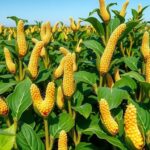Argentina’s Oilseed Sector 2024/25: A Mixed Outlook Amidst Challenges and Opportunities
The Argentine oilseed sector faces a mixed outlook for 2024/25 with reduced soybean production due to drought, while sunflower and peanut outputs remain strong. Export tax cuts are expected to boost exports, particularly to China, despite a slowdown in imports. Increased interest in sunflower cultivation suggests a potential shift in agricultural focus due to higher profitability.
The Argentine oilseed sector is projected to have a mixed outlook for the 2024/25 period, as indicated in a recent report by the US Department of Agriculture (USDA). The USDA has revised its soybean production estimate down to 49 million tonnes due to ongoing drought conditions experienced throughout January. However, positive recovery signs are emerging within the sector, as noted in the Foreign Agricultural Service’s (FAS) report from March 11.
Production figures for sunflower seeds and peanuts remain robust at 4 million tonnes and 1.605 million tonnes, respectively, according to FAS’s “Argentina: Oilseeds and Products Update.” Furthermore, an increase in exports is anticipated in the upcoming months, spurred by the Argentine government’s temporary export tax reductions on soybeans and other oilseed products, effective from January 27 to June 30, 2025. This measure aims to stimulate export activity and bolster the Central Bank’s foreign exchange reserves.
China is recognized as Argentina’s foremost soybean market, accounting for approximately 85% of total soybean exports. Nonetheless, the report highlights a notable slowdown in China’s imports from Argentina prior to the report’s publication, which is expected to persist as China engages with alternative suppliers. The USDA comments, “China’s continued large imports of whole soybeans from Argentina is in part driven by its desire to diversify its markets to source soybeans.”
Additionally, Paraguay and Uruguay have emerged as significant soybean suppliers to Argentina’s crushing industry, leveraging Argentina’s processing capabilities alongside its temporary import regime. In 2023/24, Argentina experienced high crushing volumes, leading to revisions in soybean meal exports, which are estimated at 29.5 million tonnes. Furthermore, sunflower oil exports peaked at a 16-year high, while peanut exports exceeded 1 million tonnes.
The USDA has adjusted its 2024/25 export estimate for soybeans down by 300,000 tonnes due to diminished production forecasts. Soybeans and their derivatives continue to dominate Argentina’s agricultural exports, with soybean meal constituting 11.3% of total shipments. The report cites total export value for the soybean complex, which includes soybeans, soybean meal, and soybean oil, at an impressive $19.05 billion for 2024—a remarkable 42% increase from the previous year, despite lower global prices.
While unprocessed soybean and biodiesel exports have fallen, the increase in processed product shipments has counterbalanced this decrease. The USDA explains, “Argentina’s higher soybean imports continue and are expected to remain high in the coming marketing year and beyond…” These imports primarily come from neighboring Paraguay and are facilitated by a temporary import regime that enables efficient processing in Argentina’s large crushing facilities.
Furthermore, the potential extension of export tax cuts beyond June 2025 may significantly influence farmer sales and enhance competitiveness in global markets, despite the less-than-ideal sales figures observed so far. The report notes a growing popularity of sunflower seeds as a viable alternative to soybeans and corn, particularly in regions like southern Córdoba and central and northern Buenos Aires.
The USDA attributes this shift to the sunflower’s resilience against environmental stressors and greater profitability potential compared to soybeans, noting that the input costs for sunflowers are lower, while prevailing higher market prices offer better margins. In 2024, sunflower oil exports escalated to historic levels of 1.2 million tonnes, reflecting a 17% increase from the previous year and achieving the highest volume in 16 years.
The USDA observes, “This surge in exports was driven by Argentina’s competitive pricing in global markets and stronger global demand.” Moreover, prospects for 2024/25 look promising as initial export commitments showcase a robust start, with close to 75,000 tonnes of sunflower oil products already contracted, marking the highest volume in three years.
In summary, the Argentine oilseed sector is navigating a varied landscape marked by reduced soybean production estimates due to drought yet exhibiting resilience in sunflower and peanut outputs. Government initiatives to lower export taxes are likely to stimulate trade, while China’s shifting import strategies and regional dynamics further complicate the scenario. Importantly, a transition towards sunflower cultivation is transforming the sector’s approach, ensuring higher profitability and competing against lower-margin soybeans, ultimately making 2024/25 an intriguing period for Argentina’s oilseed market.
Original Source: www.ofimagazine.com








Post Comment